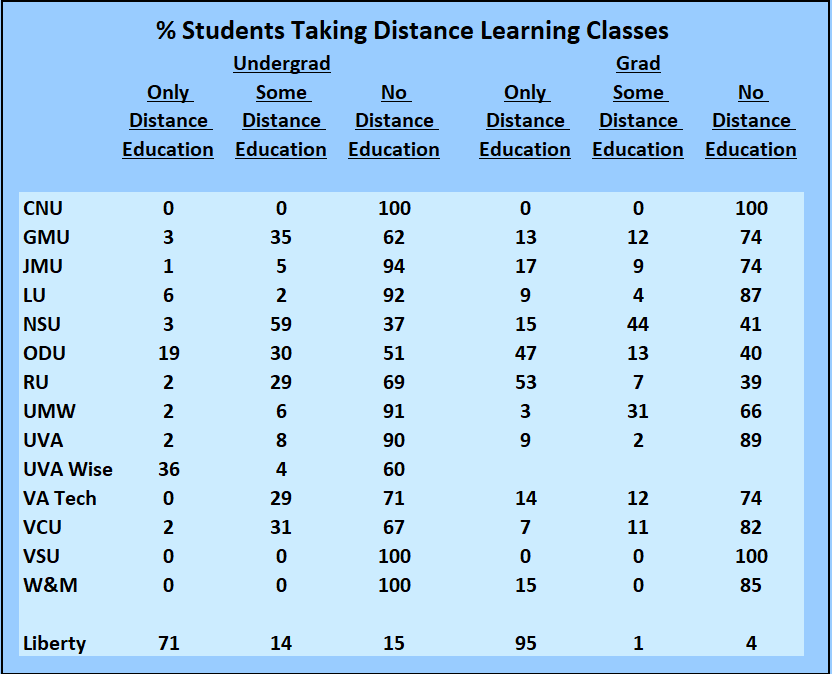
by James A. Bacon
Last week I published a table showing the level of online enrollment at Virginia’s leading higher-ed purveyors of distance education. The table exaggerated the extent to which distance learning occurs by failing to distinguish between students enrolled in distance learning-only programs and students who took an occasional distance learning class. James V. Koch, an economist and former president of Old Dominion University, has provided the more detailed table above.
According to the list I published last week, 90% of the students at George Mason University had enrolled in distance learning classes. From Koch’s data, however, we can see that only three percent of undergraduate students are enrolled full time. Another 35% of undergrads had experienced “some” distance education. (In the experience of my son, who has attended both GMU and Virginia Commonwealth University, “some” distance learning can mean one course per year.)
In other words, while distance learning may be infiltrating Virginia’s public universities, it is far less common than I portrayed last week. The real leaders in distance learning among public institutions are the University of Virginia-Wise (36% full-time enrollment) and Old Dominion University (19% full-time enrollment).
The point is more than academic to Koch, during his presidency Old Dominion University launched its TELETECHNET distance learning program in the early 1990s — much to the consternation of academic traditionalists such as the University of Virginia’s then-President John Casteen. When Koch left the presidency in 2001, TELETECHNET was ranked top ten nationally in distance learning. Unimpressed by the distinction, his successor (not the current president John Broderick) downgraded the initiative. As Koch observes, “Retrospectively, this was a monumental strategic mistake.”
Koch has written extensively about the economics of higher education, most recently, “The Impoverishment of the American College Student,” research from which I covered extensively on this blog. He has co-authored another book, soon to be published, “Runaway College Costs: How College Governing Boards Fail to Protect Their Students.”
Speaking of distance learning as a response to the COVID-19 epidemic, he writes:
How all this will play out this fall is of course not clear. Will students opt to take and be willing to pay for distance learning courses when they can’t access the usual residential benefits? Will they take distance learning courses from their own institution even if it has little experience providing such courses? Will institutions such as Liberty and Southern New Hampshire grow market share? Will price-cutting tactics take hold? I have my own views on these issues but the test of the pudding is in the eating and we’ll have to wait and see.
Koch serves with former University of Virginia Rector Helen Dragas on the board of Partners for College Affordability and Public Trust. Dragas was involved in a furor several years ago when she and several other members of the UVa Board of Visitors, citing UVa’s unwillingness to push more aggressively into online learning, forced President Teresa Sullivan to resign. Riding a counter-revolution of faculty and administrators, Sullivan was reinstated, and Dragas widely vilified.
Opining on the future of distance learning, Koch writes, “All this makes Helen Dragas look prescient. UVA continues to ignore distance learning. I suspect the strength of its brand and its endowment will enable it to survive rather nicely but it is not likely to be the source of many solutions for Virginians in the learning arena this fall. All in all, this is a rather odd position for a flagship public university.”

Leave a Reply
You must be logged in to post a comment.